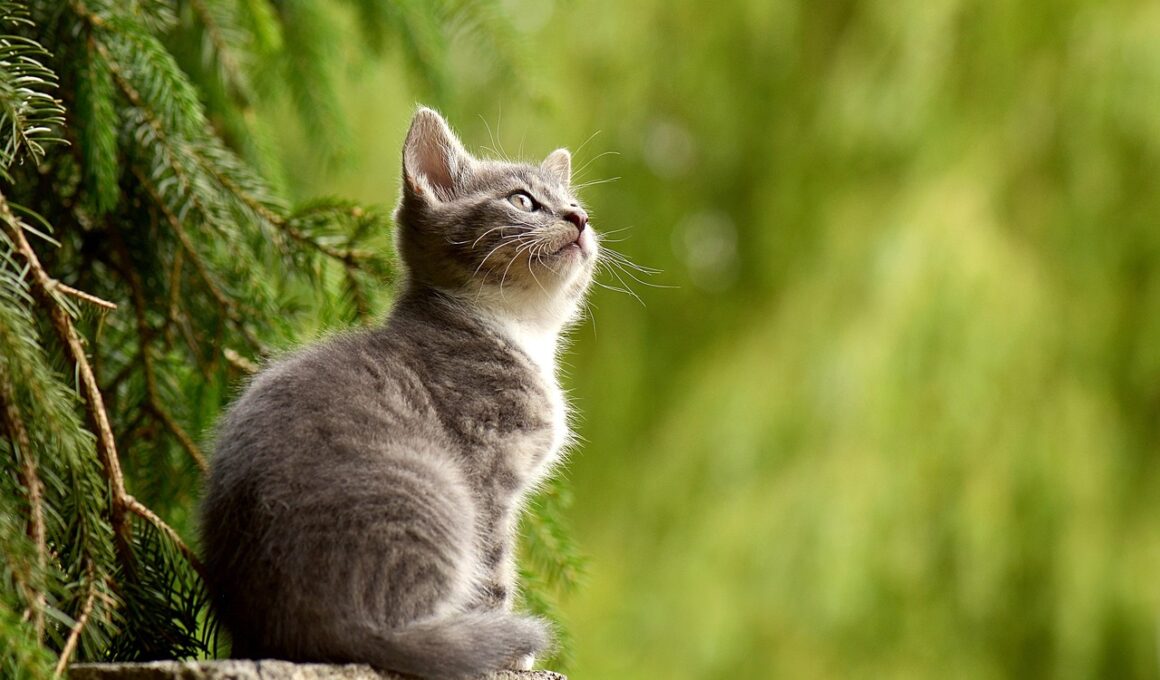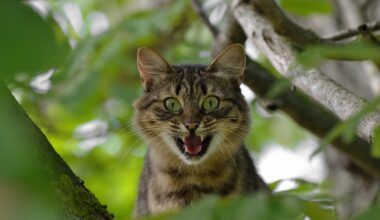The Impact of Iron Supplements on Kitten Energy Levels
Proper nutrition is crucial for the health and well-being of kittens, especially during their growth phase. Kittens require a balance of vitamins and minerals to support their energy levels and overall development. One essential nutrient that plays a significant role is iron. With the right amount of iron, kittens can maintain optimal energy levels, helping them be active and engage in their exploratory behavior. Iron is vital for the production of hemoglobin, which carries oxygen in the blood, essential for energy metabolism. A deficiency in iron may lead to anemia, resulting in reduced energy and lethargy. As such, incorporating iron supplements into a kitten’s diet can significantly enhance their quality of life. Specialized kitten diets often include iron but adding appropriate supplements might be beneficial, especially for those under veterinary care. Monitoring iron intake is essential to avoid excess, which could lead to toxicity. Consulting a veterinarian is highly recommended to determine the right dosage and form of iron for your kitten. This balance ensures that kittens develop properly while enjoying a vibrant and energetic life.
Iron supplements can provide numerous benefits for kittens, contributing significantly to their vitality. Young felines, particularly during their rapid growth stages, have unique dietary needs that may not always be met by standard food alone. By integrating iron supplements, owners can help facilitate healthy red blood cell production, thus improving the kitten’s oxygen transport. An increase in oxygen delivery enhances physical performance and energy levels, allowing kittens to play and explore their surroundings more energetically. Symptoms like fatigue or sluggish behavior could signal iron deficiency, making supplementation imperative for active development. Different types of iron supplements are available, including formulations in liquid, tablet, and chewable forms. These options provide flexibility in administration, making it easier for pet owners to give their kittens necessary nutrients. However, it is crucial to choose high-quality products that are specifically made for kittens, ensuring safety and efficacy. Although iron is essential, moderation is key, as too much iron can create health issues. Regular veterinary check-ups can help monitor iron levels and ensure your kitten is getting the right balance of nutrients needed.
Choosing the Right Iron Supplement
When selecting iron supplements for kittens, careful consideration is crucial. Different products vary widely in composition and quality, and not all supplements are suitable for young cats. Before purchasing, it is advisable to consult with a veterinarian who can recommend the most appropriate supplemental form. Some iron supplements may contain additional vitamins and minerals that might support overall health alongside iron, such as vitamin B12 and folic acid. These nutrients can work in synergy and further enhance energy levels and overall vitality. Reading product labels is essential for verifying the correct dosage and forms of iron. Options such as ferrous sulfate or ferrous gluconate are commonly used. Opt for products designed specifically for kittens, ensuring they incorporate adequate safety standards. Additionally, consider the method of administration; some kittens may prefer liquids over tablets or vice versa. Taking note of your kitten’s preferences can improve compliance with supplementation. Regular monitoring of your kitten’s health can help assess if the supplementation is effective and beneficial, allowing timely adjustments to be made if necessary.
Another important consideration when administering iron supplements to kittens is the timing and frequency of doses. Iron absorption can be influenced by various factors, including the presence of food in the stomach. Therefore, ensuring that supplements are given at a time that maximizes absorption is crucial. Typically, iron is best absorbed on an empty stomach. However, some kittens may experience digestive upset when taking supplements without food. To address this, consult your veterinarian on the most suitable feeding schedule concerning iron supplementation. This strategic approach can optimize the benefits of the supplements while minimizing potential discomfort. Furthermore, it’s necessary to observe your kitten for any adverse reactions following supplementation. Side effects, although rare, can occur, including gastrointestinal upset or changes in behavior. Keeping detailed observations allows for informed discussions with your vet if any concerns arise. Additionally, it is vital to complement supplements with a well-balanced diet of high-quality kitten food, which inherently provides other vital nutrients. This holistic approach to nutrition can contribute to sustained energy levels and overall wellness in your growing kitten.
Potential Risks of Iron Over-supplementation
While iron supplements can be beneficial, over-supplementation carries significant risks that kitten owners must be aware of. Excess iron can lead to iron toxicity, a severe condition that can be detrimental to a kitten’s health. High iron levels may cause liver damage, gastrointestinal distress, and other systemic issues. Symptoms of iron overload can include vomiting, diarrhea, and lethargy, which require urgent veterinary intervention. Therefore, it is vital not to exceed the recommended dosage provided by the veterinarian. Baseline tests of iron levels before supplementation can help ascertain how much iron is required. Aligning the supplement schedule with regular vet visits is a beneficial strategy, as these check-ups can help track a kitten’s progress and iron levels. Maintaining good communication with your vet enhances the treatment plan, allowing for adjustments if needed. Ultimately, supplementation should support a balanced diet rather than replace essential nutrients found in high-quality kitten food. Assuring healthy growth and development relies on understanding and addressing each kitten’s specific nutritional needs adequately.
In conclusion, iron supplements play a crucial role in maintaining high energy levels and overall health in kittens. When used judiciously and under veterinary guidance, they can provide essential support during critical developmental phases. Proper dosage management paired with regular monitoring ensures that your kitten receives the necessary nutrients without the risk of adverse effects. While supplements can enhance health, it’s important to prioritize a balanced diet that meets all nutritional requirements. This combination guarantees that kittens will flourish, grow strong, and enjoy their playful years filled with adventure. Any concerns or questions regarding a kitten’s health or dietary needs should lead to engaging with a qualified veterinarian. Tailoring a kitten’s nutritional strategy, complemented by iron supplements, can ultimately yield a happy and energetic companion. Pet owners can support their feline friends through informed decisions and comprehensive care. The journey of raising healthy kittens involves careful planning and responsiveness to their evolving needs, emphasizing how vital the role of iron and other nutrients is during their early lives. Following these guidelines fosters not only physical health but emotional well-being as well.
Final Thoughts on Kitten Nutrition
Nurturing a kitten’s health requires devotion and an understanding of their specific needs, especially concerning energy levels. Iron is one of those pivotal nutrients that facilitate normal development and vitality. As energetic little explorers, kittens thrive when nourished correctly. Parents need to be knowledgeable and proactive in seeking the best nutrition for their kittens. With the support of a veterinarian, owners can craft an optimal feeding plan that includes recommended supplements and healthy kitten food options. Continuous education on kitten health standards also benefits owners, ensuring they are updated on dietary recommendations. Key pointers to remember include recognizing the importance of iron, managing dosages closely, and frequently reassessing your kitten’s needs as they grow. Build a supportive environment and seek veterinary advice whenever there’s a sign of concern. Ensure that supplementation complements a thoughtful diet rather than substitutes natural food sources. Treat these decisions with seriousness, as they affect the long-term health of a beloved pet. Ultimately, a well-balanced approach to kitten nutrition leads to bright, playful hearts ready to fill the world with joy.
Engaging in kitten nutrition education opens doors to better pet care. Owners who invest time in understanding their kittens’ nutritional needs can enhance their health and lifespan. Iron supplements, like other nutritional choices, are part of this educational journey. Staying informed on the latest studies and findings regarding pet nutrition can help owners make the best decisions. Sharing knowledge within communities, through forums, or discussing with fellow pet owners serves to widen awareness. When pet owners know how to nourish their kittens adequately, they create a more thriving environment for their pets. Not only does this lead to healthier kittens, but it also fosters more robust human-animal bonds built on understanding. As kitten parents, proactive involvement in dietary strategies helps navigate potential challenges, paving the way for better health outcomes. Remember, every kitten is unique, and tailoring nutrition accordingly ensures no aspect of health is overlooked. So, embrace the journey of educating yourself continuously. These efforts collectively build stronger and lasting companionships with our feline friends.


